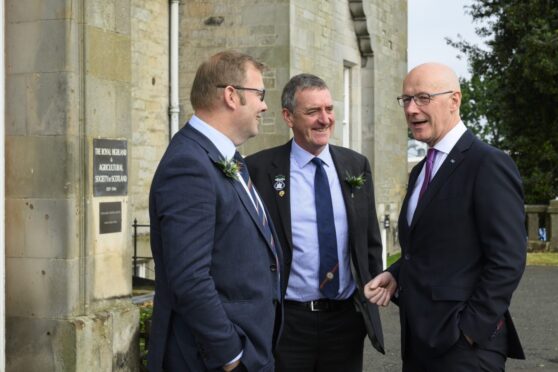A promise that the experience gained over decades of engagement with the farming sector would be “in the head and in the heart” of the the First Minister was given by John Swinney at the Royal Highland Show.
Mr Swinney said it is vital Scotland continued to provide the world with high quality, healthy beef and other meats in a sustainable fashion “due to the care, the innovation and the resilience” farmers brought to the sector.
He told the packed audience that it was his government’s aim to provide clarity and confidence on “the necessary changes” which were being introduced in farm policy.
He was speaking at the show‘s QMS industry breakfast at Ingliston
And he promised that there would be no “cliff edge” ending to support measures, with the route map providing transparency on the timing of changes.
The First Minister also revealed that the cornerstone code of practice on regenerative and sustainable farming which would be integral to the new support measures was at an advanced stage.
He said early drafts had already been discussed with industry groups with a view to carrying out a wider consultation in the coming months.
He said that this was key to producing excellent food in a sustainable way, farming with nature to improve biodiversity and farm profitability – but added some of the measures required more to be done in return for the support offered.
The introduction of the Whole Farm Plan in 2025 would play its role by requiring farmers to complete at least two out of five base-lining measures – the completion of a carbon audit, a biodiversity audit, an animal health and welfare plan, an integrated pest management plan and soil sampling and testing on improved land.
John Swinney cites ‘commitment’ in Royal Highland Show speech
And Mr Swinney claimed that the introduction of calving interval requirements to the suckler beef scheme would help that strikes a balance between productivity, profitability and climate impact.
“By incentivising shorter calving intervals we aim to reduce emissions intensity in cattle production systems and this reform represents our commitment to sustainable beef production and environmental stewardship,” he said.
However, at the launch of the Scottish Conservatives’ rural manifesto, the convener of the Scottish Parliament’s agriculture committee, Finlay Carson MSP, took aim at the administration’s approach.
He said that the “Tartan CAP” approach adopted by both the union and the SNP administration represented a missed opportunity to provide both direction and clarity to Scotland’s farmers.
The party’s shadow cabinet secretary for rural affairs, Rachel Hamilton MSP, claimed that farmers still lacked any clear detail on policy direction after six years of discussions.
She promised that the Conservatives would deliver a “sensible plan” that drove investment in technology and investment – backed by an additional £1 billion for UK-wide farm support over the course of the next parliament.

